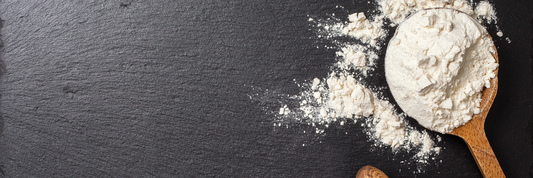Parmesan cheese is widely recognized for its nutty, savory flavor but beyond its culinary appeal lies a powerhouse of nutrition. As a hard, aged Italian cheese, parmesan delivers concentrated protein, essential minerals, and digestive-friendly properties, making it much more than just a topping.
In this article, we explore the full scope of Parmesan cheese benefits, break down its macronutrient and micronutrient content, and explain why it fits well into various special diets. Whether you're a home cook, a health-conscious eater, or someone managing lactose intake, understanding Parmesan cheese nutrition can help you make smarter food choices while enjoying bold flavor.
- Parmesan Cheese – Everything You Need to Know
- Cheese and cholesterol: Is it safe and which kinds are best?
- How to Cut Parmesan the Right Way
Parmesan Cheese Nutrition
Parmesan cheese is widely recognized for its distinctive nutty and savory flavor, but it also merits attention for its rich and concentrated nutrient profile. This hard, aged Italian cheese boasts a complex nutritional composition, making it a valuable addition to a balanced diet. In this detailed exploration, we will examine the macronutrient and micronutrient content of parmesan cheese per 100 grams, as well as how it compares to other common cheeses in terms of nutritional density, moisture content, fats, and aging processes.

Macronutrients: Protein, Fat, Carbohydrates, and Calorie Content per 100 Grams
Parmesan cheese is regarded as one of the most nutrient-dense cheeses available, especially due to its unique aging process and moisture levels. Let us explore the key macronutrient components:
- Calories: Parmesan cheese provides between 390 and 402 kilocalories per 100 grams. This relatively high caloric content comes from its concentrated fat and protein content, reflecting the cheese’s low moisture and high nutrient density.
- Protein: One of the most notable nutritional attributes of parmesan cheese is its protein content, which ranges from approximately 32 to 36 grams per 100 grams. This high-quality protein is complete, containing all essential amino acids. The long aging process inherent to parmesan production helps break down proteins into smaller peptides and amino acids. This makes the protein easier to digest and absorb, supporting muscle growth, repair, and general health maintenance.
- Fat: Parmesan contains approximately 28 to 30 grams of total fat per 100 grams. This fat content is primarily composed of saturated and monounsaturated fats. These fats contribute to the cheese’s creamy texture and rich flavor while remaining moderately lower in fat compared to many soft cheeses that often contain additional moisture and cream.
- Carbohydrates: The carbohydrate content in parmesan cheese is very low, typically between 0 and 3 grams per 100 grams. Most of the natural lactose present in milk is broken down during the extended maturation period, rendering parmesan virtually lactose-free. This characteristic makes parmesan cheese a suitable option for individuals with lactose sensitivity or intolerance.
- Cholesterol and Sodium: Parmesan cheese contains a relatively high amount of cholesterol, approximately 80 to 89 milligrams per 100 grams, which is expected in aged hard cheeses. Sodium levels range from 620 to 1000 milligrams per 100 grams due to salt added during the cheese-making and aging process, enhancing flavor and preservation. Individuals mindful of sodium intake should consume parmesan in moderation as part of a balanced diet.
Micronutrients: Calcium, Phosphorus, Zinc, Vitamin A, and Vitamin B12
Beyond its macronutrient composition, parmesan cheese is a significant source of vital micronutrients that contribute to various physiological functions:
- Calcium: Parmesan cheese is remarkable for its high calcium content, offering approximately 900 to 1150 milligrams per 100 grams. This amount represents more than half of the average adult daily calcium requirement. Calcium is essential for maintaining strong bones and teeth, facilitating blood clotting, muscle contraction, and nerve transmission.
- Phosphorus: With 650 to 700 milligrams of phosphorus per 100 grams, parmesan complements its calcium content by supporting bone mineralization and playing a critical role in energy metabolism, DNA synthesis, and cellular repair.
- Zinc: Parmesan provides around 4 milligrams of zinc per 100 grams. Zinc is a trace mineral crucial for immune system function, wound healing, DNA and protein synthesis, and maintaining a healthy sense of taste and smell.
- Vitamin A: The vitamin A content in parmesan ranges from 400 to 430 micrograms per 100 grams. Vitamin A supports vision, immune response, skin health, and cellular growth.
- Vitamin B12: Parmesan is a valuable source of vitamin B12, with about 1.8 micrograms per 100 grams. Vitamin B12 is critical for red blood cell formation, neurological function, and DNA synthesis, making parmesan a significant nutrient contributor, especially for those with dietary restrictions involving animal products.
Comparison with Other Cheeses: High Protein, Low Moisture, and Longer Aging
When comparing parmesan cheese to other frequently consumed varieties such as mozzarella, cheddar, and brie, several distinguishing nutritional and processing features stand out:
- Protein Concentration: Parmesan contains significantly higher amounts of protein than many other cheeses. While mozzarella offers roughly 22 grams of protein per 100 grams and cheddar about 25 grams, parmesan’s protein content exceeds 30 grams. This makes parmesan an excellent protein source, especially important for individuals aiming to increase their protein intake in a calorie-conscious manner.
- Moisture Content: The moisture content of parmesan cheese is approximately 31 percent, which is much lower than softer cheeses. This low moisture content results from the lengthy ripening process, producing a firm, granular texture. Moisture reduction concentrates the nutrients in parmesan, providing increased flavor intensity and nutritional density per serving.
- Aging Process: Parmesan cheese undergoes a mandatory aging period of at least 12 months, often extending up to 24 or 36 months. This extended maturation evaporates moisture, increases flavor complexity, and breaks down lactose and proteins into more digestible forms. Longer aging not only enhances the taste profile but also improves shelf life and reduces lactose content, distinguishing parmesan from fresher cheeses that retain higher moisture and lactose.
- Fat Content Relative to Soft Cheeses: Although parmesan has substantial fat, it is generally lower in fat than softer, creamier cheeses such as brie or triple-cream varieties. This balance allows parmesan to deliver a rich flavor without contributing excessive fat, thereby providing versatility for health-conscious consumers.
- Micronutrient Density: Micronutrient levels such as calcium and phosphorus in parmesan are higher than those found in many soft cheeses. This contributes to its reputation as a functional food that not only adds flavor but also enhances dietary nutrient intake. Vitamins A and B12 are also well represented, supporting various metabolic and physiological processes.
Health Benefits of Parmesan Cheese
Parmesan cheese is much more than a flavorful ingredient that enhances the taste of pasta, salads, and various dishes. Thanks to its rich nutritional profile and traditional aging process, parmesan offers several important health benefits that support overall wellness. Below, we explore these benefits in depth, highlighting how this classic cheese can contribute positively to bone health, muscle maintenance, digestion, immunity, weight management, and cardiovascular support.
Supports Bone Health
One of the primary and most well-documented health benefits of parmesan cheese is its ability to support bone health. This benefit stems largely from its exceptionally high content of calcium and phosphorus, two minerals critical for maintaining strong and durable bones and teeth.
- Calcium in parmesan is present in amounts ranging from 900 to 1150 milligrams per 100 grams, which approximates over half of the average adult daily requirement. Calcium is integral for bone mineralization, working to build and maintain bone density throughout life and helping to prevent bone disorders such as osteoporosis.
- Phosphorus complements calcium’s function by aiding in the formation of bones and teeth while also playing a key role in energy metabolism and tissue repair. Parmesan provides about 650 to 700 milligrams of phosphorus per 100 grams.
The synergy between calcium and phosphorus in parmesan improves the efficiency of mineral absorption and bone formation. Consuming parmesan regularly, as part of a balanced diet, may reduce the risk of bone fractures and promote skeletal strength during aging, making it especially beneficial for older adults or individuals at risk of bone density loss.
Excellent Protein Source
Another substantial health advantage of parmesan cheese is its status as a high-quality protein source. Protein content in parmesan ranges from 32 to 36 grams per 100 grams, making it one of the richest protein cheeses available.
- The protein is considered complete, meaning it contains all the essential amino acids necessary for muscle protein synthesis and general bodily function. These amino acids help repair muscle tissue after physical activity, support immune function, and contribute to hormone production.
- High protein intake is also associated with increased satiety, which means parmesan can help promote a feeling of fullness and reduce overall calorie intake. This property is particularly useful for those managing their weight or controlling appetite.
Parmesan’s protein also benefits athletes, older adults, and anyone seeking to maintain lean muscle mass, especially during calorie restriction or periods of increased physical demand.

Digestive-Friendly
Parmesan cheese is notably digestive-friendly compared to many other dairy products, primarily because of its extended aging process.
- The lengthy maturation, often lasting over 12 to 36 months, breaks down most of the lactose naturally found in milk into simpler sugars and acids. This results in a cheese that is virtually lactose-free, or extremely low in lactose.
- As a consequence, parmesan cheese is well-tolerated by most individuals with lactose intolerance or sensitivity, who often experience digestive discomfort such as bloating or gas after consuming dairy products.
Thus, parmesan offers a palatable option for those who wish to enjoy cheese flavor without the typical digestive challenges posed by fresh or soft cheeses that still contain significant lactose.
Boosts Immunity
One of the less commonly recognized benefits of parmesan cheese is its potential to boost immunity through its content of natural probiotics.
- These probiotics are beneficial bacteria that develop during the fermentation and aging process. While parmesan is not a high-probiotic food like yogurt or kefir, the presence of these live cultures contributes to a balanced gut microbiome.
- A healthy gut flora plays a critical role in maintaining the body’s immune defenses, helping to protect against harmful pathogens, and supporting overall immune system regulation.
By incorporating parmesan cheese into the diet, individuals may indirectly support immune health through microbiome balance, especially when paired with other probiotic-rich foods.
Weight Management
Parmesan cheese can also be a useful food for weight management due to its unique nutritional composition:
- It is high in protein, which is well-known to stimulate satiety hormones and reduce hunger, helping people to eat less overall.
- At the same time, parmesan is low in carbohydrates, often containing between 0 and 3 grams per 100 grams. This low carb content makes it ideal for those following low-carb, ketogenic, or other carbohydrate-controlled diets.
- Its high nutrient density also means smaller portions can deliver satisfying flavor and nutrition, which supports portion control and reduces the risk of overeating.
For those seeking to maintain or lose weight, adding parmesan to meals can enhance flavor without excessive calories or carbs while promoting fullness and maintaining muscle mass.
Heart Support
Emerging research points to several components in parmesan cheese that may contribute to cardiovascular health:
- Conjugated linoleic acid (CLA), a naturally occurring fatty acid present in parmesan, has been studied for potential benefits such as reducing body fat and improving cholesterol profiles.
- Vitamin K2, also found in parmesan, is crucial for cardiovascular health as it helps regulate calcium metabolism. Vitamin K2 activates proteins that prevent calcium deposits from building up in arteries, which can reduce arterial stiffness and lower the risk of heart disease.
- These nutrients collectively support healthy blood vessels and may contribute to better heart function, especially when parmesan is consumed as part of a heart-healthy diet rich in whole foods.
Parmesan Cheese in Special Diets
Parmesan cheese is a versatile dairy product that fits well into several special dietary plans, particularly those focused on low carbohydrate intake and lactose sensitivity. However, its traditional production methods affect its suitability for vegetarian and vegan diets. Below, we explore how parmesan aligns with these specific dietary considerations.
Low-Carb and Keto-Friendly: Naturally Low in Carbohydrates
Parmesan cheese is an excellent choice for low-carbohydrate and ketogenic diets because it is naturally low in carbohydrates. Typically, it contains between 0 and 3 grams of carbohydrates per 100 grams, with most of its lactose the milk sugar broken down during its long aging process. This makes parmesan not only low in carbs but also nearly lactose-free, minimizing blood sugar spikes and supporting ketosis, the metabolic state targeted by keto diets.
Its high fat content combined with substantial protein further supports keto diet goals by providing energy and promoting satiety. Incorporating parmesan into meals can help maintain a low-carb nutritional profile while adding rich flavor and satisfying texture, making it ideal for ketogenic meal plans and low-carb eating strategies.
Suitable for Lactose-Sensitive Individuals: Low Lactose Levels
Many people struggle with lactose intolerance, which can cause digestive discomfort after consuming dairy products. Parmesan cheese’s extended aging, which often lasts from 12 months to several years, naturally reduces its lactose content to very low or near-zero levels. During this maturation, enzymes break down lactose into simpler sugars and acids.
Because of this, parmesan cheese is considered one of the safer cheese options for lactose-sensitive individuals. Most people with mild to moderate lactose intolerance can enjoy parmesan without experiencing the common symptoms such as bloating, gas, or diarrhea that other fresher cheeses often produce. However, those with severe lactose intolerance should still proceed cautiously and consult a healthcare provider if uncertain.
Not Vegan or Vegetarian: Typically Contains Animal Rennet
While parmesan cheese offers many nutritional benefits, it is important to note its limitations concerning vegan and vegetarian diets.
Traditionally, parmesan is made using animal rennet, an enzyme extracted from the stomach lining of young calves. This ingredient is critical in the cheese-making process, as it helps coagulate the milk, forming curds that eventually mature into parmesan.
Because of this, parmesan cheese is generally not considered vegetarian-friendly by those who avoid animal-derived products. It is also unsuitable for vegans, who exclude all animal products from their diet.
For vegetarians seeking similar flavors and textures without animal rennet, there are alternative hard cheeses made with microbial or vegetable-based rennet, but these will not be true parmesan and may vary in taste and aging profile. Vegans, meanwhile, often use plant based.
Pros of Parmesan Cheese
Parmesan cheese offers a variety of advantages that make it a highly valued ingredient in both culinary and nutritional contexts. Its unique combination of nutrient density, longevity, versatility, and taste qualities highlight why parmesan is a staple in many kitchens around the world.
Nutrient-Dense and Protein-Rich
One of the primary benefits of parmesan cheese is its exceptional nutrient profile. It is packed with high-quality protein, providing approximately 32 to 36 grams per 100 grams. This complete protein contains all essential amino acids necessary for muscle repair, immune function, and overall health. Additionally, parmesan is rich in vital minerals such as calcium, phosphorus, and zinc, as well as vitamins A and B12. This dense concentration of nutrients makes it an excellent choice for those looking to enhance their diet with nutrient-rich foods without consuming large volumes.
Long Shelf Life
Parmesan cheese boasts an impressive shelf life compared to many other cheeses, thanks to its low moisture content and prolonged aging period, which often exceeds 12 months. This extended maturation not only intensifies its flavor but also inhibits spoilage and bacterial growth. Once opened, parmesan can be stored in a refrigerator for weeks without significant loss of quality, making it an economical and practical cheese for everyday use or emergency pantry stocking.
Easy to Incorporate Into Many Dishes
The versatility of parmesan cheese is another prominent advantage. Its rich, umami-packed flavor elevates a wide range of dishes, from pastas and risottos to salads, soups, and snacks. Due to its intensely flavorful nature, only a small amount is needed to add depth and complexity to recipes, which can help control calorie and fat intake while still imparting robust taste. Parmesan can be grated, shaved, melted, or even eaten in chunks, offering multiple ways to enjoy it in various culinary contexts.
Low in Lactose
Thanks to its lengthy aging process, parmesan is naturally low in lactose. Most of the lactose present in milk is broken down during maturation, rendering the cheese virtually lactose-free. This characteristic makes parmesan suitable for many people who are lactose intolerant or sensitive, allowing them to enjoy cheese with minimal digestive discomfort compared to fresh or soft cheeses that retain higher lactose levels.
Flavorful Even in Small Amounts
Parmesan cheese is prized for its concentrated and complex flavor profile that combines nutty, savory, and slightly fruity notes. Its intensity means that even small quantities can significantly enhance the taste of a dish. This flavor efficiency translates into less cheese needed per serving, which can reduce overall fat and calorie consumption without sacrificing culinary satisfaction.
Cons of Parmesan Cheese
While parmesan cheese offers many nutritional and culinary benefits, it also has certain drawbacks that may affect its suitability for some individuals or dietary goals. Understanding these limitations can help consumers make informed choices about including parmesan in their diets.
High in Sodium
One of the notable drawbacks of parmesan cheese is its high sodium content. Parmesan typically contains between 620 and 1000 milligrams of sodium per 100 grams, which is considerable compared to many other foods. The salt is added during the cheese-making and aging process to enhance flavor and preserve the product, but this level of sodium can contribute to increased blood pressure and cardiovascular risk in sensitive individuals. Those monitoring their sodium intake for hypertension or heart health should consume parmesan in moderation or seek lower-sodium alternatives.
Contains Saturated Fat
Parmesan cheese contains saturated fat, generally around 18 to 20 grams per 100 grams. Saturated fat intake has been linked to an increased risk of heart disease when consumed in excess, as it may raise LDL (bad) cholesterol levels. While the fat content contributes to parmesan’s rich taste and creamy texture, those concerned about their cardiovascular health or following fat-restricted diets should be mindful of portion sizes and overall daily saturated fat consumption.
May Not Be Suitable for Dairy Allergies
Parmesan is a dairy product derived from cow’s milk, which makes it unsuitable for individuals with dairy allergies. Unlike lactose intolerance, which involves difficulty digesting milk sugar, a dairy allergy is an immune reaction to milk proteins such as casein. Consuming parmesan in such cases can lead to serious allergic reactions, including hives, swelling, or anaphylaxis. Therefore, anyone with a diagnosed dairy allergy should avoid parmesan cheese altogether.
Not Suitable for Vegan Diets
Parmesan cheese is traditionally made using animal rennet, an enzyme extracted from the stomach lining of calves, which classifies it as a non-vegan product. Because of this animal-derived ingredient, parmesan cheese is not suitable for those following vegan diets. Additionally, it does not meet vegetarian criteria for some who avoid animal rennet. Vegans and vegetarians looking for cheese alternatives must turn to specialized plant-based products or cheeses made with microbial or vegetable rennet.

How to Store Parmesan Cheese to Keep Its Benefit
Proper storage of parmesan cheese is essential to maintain its rich flavor, nutrient density, and overall quality. Given parmesan’s low moisture content and long shelf life, handling it correctly can help preserve its nutritional benefits while minimizing spoilage and waste. Below, we detail best practices for storing parmesan cheese effectively.
Contact us now to find the right sustainable packaging for your needs.
Store in the Fridge: Wrap Tightly or Place in Airtight Food-Safe Containers
Parmesan cheese should always be stored in the refrigerator to preserve its freshness and prevent bacterial growth. To maintain quality:
- Wrap the cheese tightly with wax paper, parchment paper, or cheese paper first these materials allow the cheese to breathe without trapping excess moisture.
- Over the wrapping, seal the cheese in an airtight plastic wrap or place it inside a food-safe airtight container. This double layer protects parmesan from drying out and absorbing unwanted fridge odors, which can affect taste.
- Avoid using aluminum foil directly against the cheese, as it can sometimes impart metallic flavors or cause the surface to degrade.
Storing parmesan this way helps preserve its texture, flavor, and nutrient integrity over time, ensuring you retain its calcium, protein, and vitamins while enjoying its full umami profile.
Freeze for Long-Term Use: Best Grated Before Freezing
If you have a large quantity of parmesan or want to extend its usability beyond typical refrigerated storage:
- Grate the cheese before freezing. Grated parmesan freezes better than a whole block because it is easier to portion out and use without thawing the entire piece.
- Place the grated parmesan in a resealable freezer bag or airtight container to prevent freezer burn and moisture intrusion.
- Frozen parmesan can last up to 6 months or more while maintaining much of its nutritional value and flavor.
Freezing is useful for long-term preservation, but note that the texture of parmesan may become slightly crumbly after freezing. However, its taste and nutritional benefits remain mostly intact, making it a practical option for long-term storage.
Avoid Moisture and Odor Exposure to Prevent Spoilage
Moisture and exposure to strong odors are two primary factors that can accelerate parmesan cheese spoilage and diminish its quality.
- Always ensure the cheese is dry before wrapping and storing. Moisture fosters mold growth and softens the hard cheese texture, undermining its shelf life and nutritional profile.
- Keep parmesan away from foods with pungent odors, such as onions or fish, as parmesan can readily absorb these smells, altering its delicate flavor.
- Regularly inspect stored parmesan for any signs of mold or spoilage, removing affected parts promptly to avoid contamination of the rest.
By preventing moisture buildup and odor contamination, you protect parmesan’s flavor and extend its usable life, preserving its healthful qualities.
How to Store Cheese Properly (Must-Know Tips for Longer Freshness)
Proper Storage Equals Less Waste and Preserved Nutrition
Adhering to proper storage practices not only safeguards parmesan cheese’s sensory and nutritional properties but also helps minimize food waste. Because parmesan is nutrient-dense and often used sparingly, maintaining its freshness reduces the need for frequent repurchasing and preserves its valuable protein, minerals, and vitamins.
Conclusion
From its high calcium and protein content to its digestive and heart health support, Parmesan cheese benefits extend far beyond taste. Its unique aging process enhances not only flavor but also nutritional value, making it suitable for low-carb and lactose-sensitive diets. With proper storage, parmesan retains its quality for weeks or months, offering convenience and reduced food waste. Whether grated on pasta or used as a standalone snack, this nutrient-dense cheese proves that healthy eating can be flavorful too. For anyone seeking a functional, delicious, and diet-friendly cheese, Parmesan cheese nutrition makes it a standout choice.







